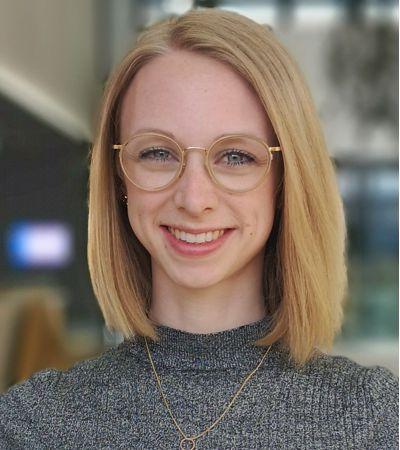
Friederike Nintzel received her bachelor’s degree in Biochemistry from the Ruprecht-Karls-University of Heidelberg, Germany.
During her bachelor’s study, she conducted several research internships: She researched in structural biology with Dr. Christian Biertümpfel at the Max Planck Institute of Biochemistry in Martinsried, Germany. Furthermore, she researched in virology with Prof. Dr. Gülsah Gabriel at the HPI - Leibniz Institute for Experimental Virology in Hamburg, Germany and she performed a research internship in environmental toxicology with Dr. Johan Lundqvist at the VHC Research Centre at SLU Uppsala in Sweden. Additionally, she worked as teaching assistant at the University of Heidelberg.
For her bachelor’s thesis, she researched in phototrophic whole-cell biocatalysis with Prof. Bruno Bühler at the Helmholtz Centre for Environmental Research in Leipzig, Germany. She worked on establishing a synthetic cascade for the conversion of cyclohexane to epsilon-caprolactone in Pseudomonas taiwanensis and Synechocystis sp. PCC 6803.
Friederike pursued a master’s degree in Life Science & Technology with an Annotation in Technology for Sustainable Development at Delft University of Technology in the Netherlands. During her master’s thesis, she researched in enzyme biocatalysis with Prof. Sven Panke at ETH Zürich D-BSSE in collaboration with Prof. Frank Hollmann at TU Delft. Her thesis aimed at immobilisation of peroxygenase rAaeUPO for increased performance in hydrophobic environments and application of the catalyst for synthesis of epoxides in neat reactions (published in Nintzel et al. 2021, Chemical Communications).
Furthermore, being highly enthusiastic about sustainability, she was working at the interface of sustainability, technology, and innovation during an internship at Merck KGaA, Darmstadt, Germany.
| Host institution | University of Cambridge, Department of Biochemistry, Cambridge, UK |
| Supervisor | Prof. Florian Hollfelder |
| Co-Supervisors | Prof. Roger Strömberg, Karolinska Institutet, Stockholm, Sweden (Academic) |
| Dr. Anna Perdrix Rosell, Sixfold Bioscience, London, UK (Industrial) |